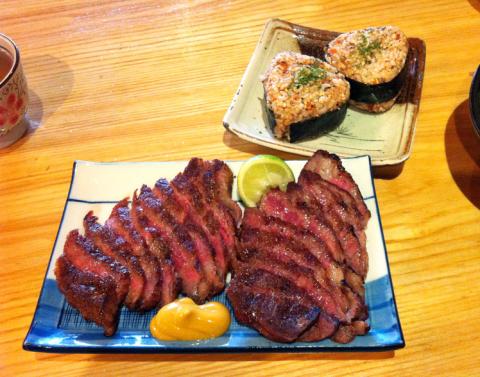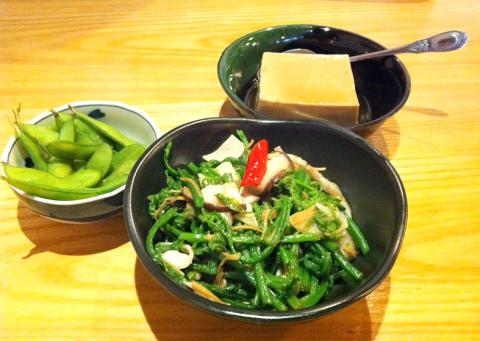Take your shoes off, eat light and leave feeling utterly satisfied after a visit to Weitzuman (味自慢), an izakaya near Jingmei MRT Station (景美捷運站). The izakaya, Japan’s version of a tapas bar, is meant to be an after-work destination where friends and colleagues share small, savory dishes and wash the food down with sake and beer. With its welcoming atmosphere and a menu of grilled, deep-fried and cold dishes, Weitzuman fits the description well.
The food is great. There was not one dud among the handful of dishes ordered on a recent visit. Fresh sashimi (NT$350 for a small plate, NT$480 for a large serving) is available as at most sit-down Japanese eateries, but there are many more interesting choices.
My dining companion and I did well by following the friendly waitstaff’s suggestions, which included several house recommendations listed on the menu. The “field mushrooms with mountain fern vegetable” (野菇山蕨, NT$160) was a delectable stir-fried dish, with thin and tenderly cooked slices of shitake and golden-needle mushrooms serving as a nice complement to the shanjuecai (山蕨菜), a vegetable with a crunchy stalk and a mild flavor.

Photo: David Chen, Taipei Times
The homemade sesame tofu (手工胡麻豆腐, NT$100) was a revelation: The dish arrived looking like a plain, ho-hum block of soft tofu, but were we in for a surprise. This concoction, made with crushed sesame seeds, had us laughing out loud with pleasure from the very first bite. The savory, nutty flavor of the sesame seeds was a perfect match for the creamy, mousse-like consistency of the tofu. Don’t leave the restaurant without trying it.
Weitzuman is refreshingly unpretentious and has the kind of down-home charm one might imagine of a traditional Japanese inn. Enter through sliding wooden doors, take a seat at the front and watch the chefs at work.
Large parties can sit cross-legged on benches in the front room or on cushions on an elevated wooden floor in the back. Either way, you’ll be taking off your shoes before taking your seat.

Photo: David Chen, Taipei Times
Adding to the relaxed, lived-in feel, the restaurant plays nakashi (那卡西) oldies, sung both in Japanese and Hoklo (commonly known as Taiwanese), at a civilized volume. Weitzuman has been at this location for eight years (it has been in the Jingmei area for 15 years), and you can tell that not much has changed: The wallpaper is faded and peeling a little, but the place is generally tidy, albeit a bit cluttered. Near the front door sit stacked boxes of beer: Tall bottles of Asahi are NT$130, Taiwan Beer is NT$100 and regular sized bottles of Heineken are NT$80. Sake is available and ranges from NT$180 to NT$680 per 300ml serving.
In general, the food portions for each dish are just enough for two persons. We ordered seven dishes, including miso soup (NT$50), and our lunch totaled around NT$850.
It was very much worth the price — our meal only got better. The “top grade beef steak” (特優牛小排, NT$280), thinly sliced and grilled so it was charred on the outside and red on the inside, was melt-in-your-mouth delicious. It came with a lemon wedge and yellow mustard (the kind you put on 7-Eleven hot dogs), which I initially scoffed at, but quickly changed my mind after a taste: They went together perfectly. The salmon onigiri (鮭魚飯糰, NT$80 for two), or rice balls with salmon flakes, is also worth a try, and the grilled shitake mushrooms (香菇串烤, NT$70), rounded out our meal nicely.
Reservations are recommended at Weitzuman, although we didn’t need one on Sunday afternoon, the only time of the week the restaurant is open for lunch.

That US assistance was a model for Taiwan’s spectacular development success was early recognized by policymakers and analysts. In a report to the US Congress for the fiscal year 1962, former President John F. Kennedy noted Taiwan’s “rapid economic growth,” was “producing a substantial net gain in living.” Kennedy had a stake in Taiwan’s achievements and the US’ official development assistance (ODA) in general: In September 1961, his entreaty to make the 1960s a “decade of development,” and an accompanying proposal for dedicated legislation to this end, had been formalized by congressional passage of the Foreign Assistance Act. Two

March 31 to April 6 On May 13, 1950, National Taiwan University Hospital otolaryngologist Su You-peng (蘇友鵬) was summoned to the director’s office. He thought someone had complained about him practicing the violin at night, but when he entered the room, he knew something was terribly wrong. He saw several burly men who appeared to be government secret agents, and three other resident doctors: internist Hsu Chiang (許強), dermatologist Hu Pao-chen (胡寶珍) and ophthalmologist Hu Hsin-lin (胡鑫麟). They were handcuffed, herded onto two jeeps and taken to the Secrecy Bureau (保密局) for questioning. Su was still in his doctor’s robes at

Last week the Democratic Progressive Party (DPP) said that the budget cuts voted for by the China-aligned parties in the legislature, are intended to force the DPP to hike electricity rates. The public would then blame it for the rate hike. It’s fairly clear that the first part of that is correct. Slashing the budget of state-run Taiwan Power Co (Taipower, 台電) is a move intended to cause discontent with the DPP when electricity rates go up. Taipower’s debt, NT$422.9 billion (US$12.78 billion), is one of the numerous permanent crises created by the nation’s construction-industrial state and the developmentalist mentality it

Experts say that the devastating earthquake in Myanmar on Friday was likely the strongest to hit the country in decades, with disaster modeling suggesting thousands could be dead. Automatic assessments from the US Geological Survey (USGS) said the shallow 7.7-magnitude quake northwest of the central Myanmar city of Sagaing triggered a red alert for shaking-related fatalities and economic losses. “High casualties and extensive damage are probable and the disaster is likely widespread,” it said, locating the epicentre near the central Myanmar city of Mandalay, home to more than a million people. Myanmar’s ruling junta said on Saturday morning that the number killed had